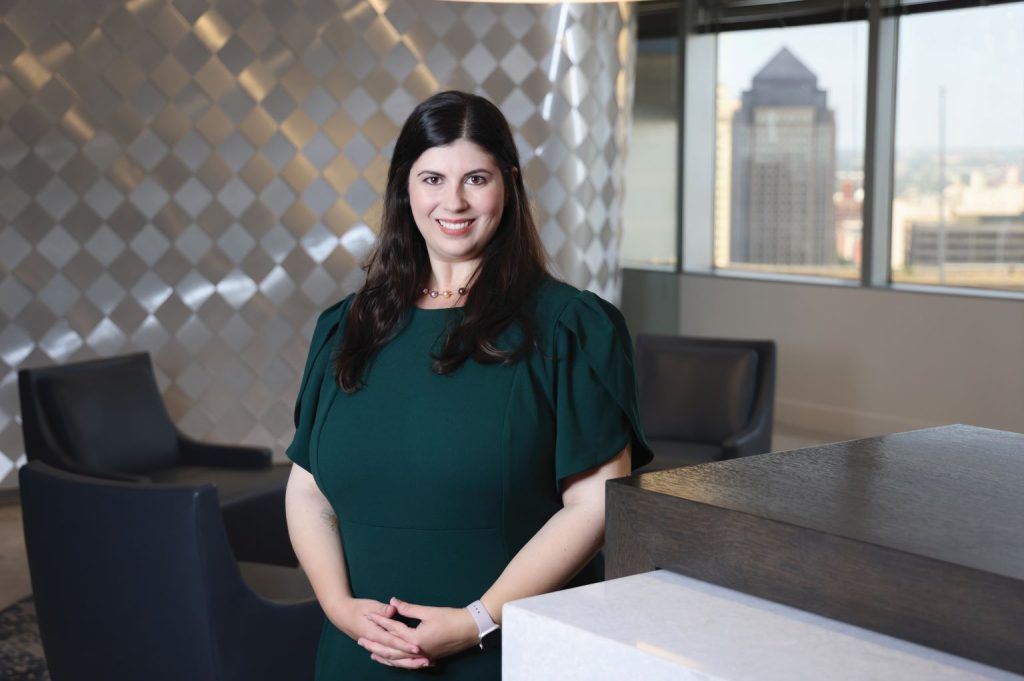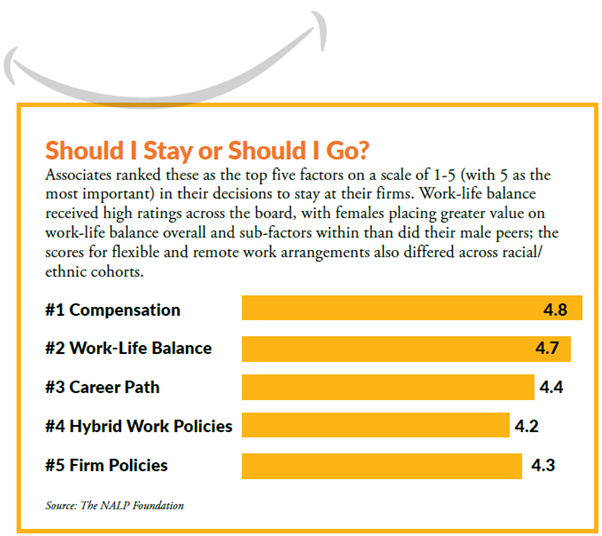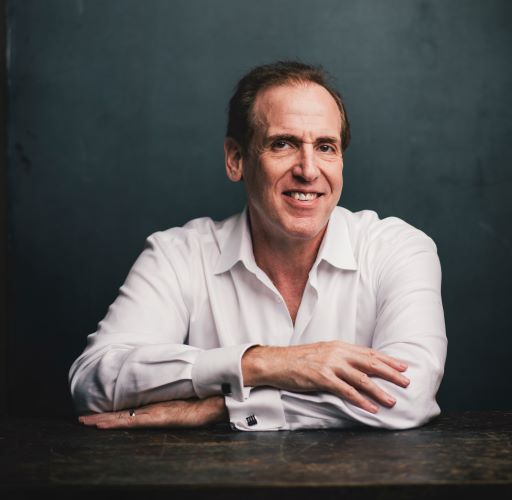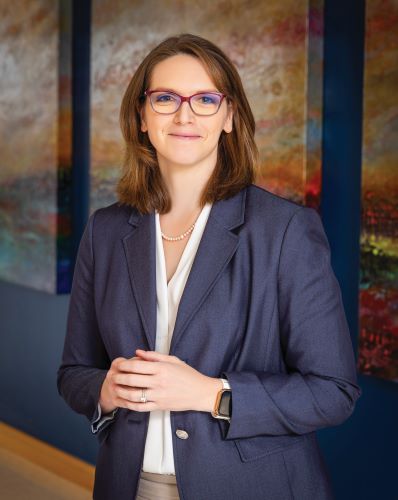Many law students assume that successful, prestigious careers will lead to happiness. But research shows that happiness requires autonomy, rewarding work and human connections.
Elizabeth Klucher Reynolds, the daughter of a probate magistrate and retired trust officer, often heard her parents discuss their work and the satisfaction it brought them.
Reynolds majored in opera performance at Mercyhurst University in Pennsylvania, but after deciding to change career paths, the Ohio native enrolled at Cleveland State University College of Law.
She decided to follow in her parents’ footsteps and focus on trusts and estates.
“It’s very satisfying work because I am able to help people navigate through difficult times in their lives, allowing them to grieve the loss of a loved one and begin the next chapter without having to worry about the legal process,” Reynolds said.
She’s been an associate at three firms, most recently joining the Cleveland office of Buckingham, Doolittle & Burroughs, where she is now able to focus more of her efforts on the work she prefers, estate planning.
The 80-attorney firm with offices in Cleveland, Akron and Canton lets lawyers set their own schedules, give back to the community and, if they choose, change practice areas along the way.
“We have a strong summer associate program that allows us to get to know potential hires, including their areas of interest, and we try to match those interests to our needs within the firm,” said Steve Dimengo, president and managing partner.
“We treat our attorneys like adults, so we trust them to manage their workflow, including the location where they work. Our flexibility extends right down to the dress code, so if a lawyer is not planning to meet a client or go to court, he or she is not required to show up in a suit.”

Reynolds said she joined Buckingham, Doolittle & Burroughs because the firm offered her the flexibility and freedom to create her own destiny in terms of how she develops her practice, while providing a collegial and supportive culture where she can thrive.
The ability to chart one’s own course and do meaningful work, while feeling connected to others and supported by supervisors, are some of the key predictors of attorney happiness identified in a comprehensive study titled “What Makes Lawyers Happy? A Data-Driven Prescription to Redefine Professional Success.”
Lawrence Krieger, a clinical professor at Florida State University College of Law, and Kennon Sheldon, a professor at University of Missouri, published the report in 2015. They surveyed 6,200 lawyers, judges and other legal professionals across four states. What they learned dispelled the common belief that lawyer happiness was dependent on high status and high pay.
Krieger and Sheldon found that as with other segments of society, income has little effect on lawyers’ happiness unless it is too low to meet basic living expenses.
“Most striking in this regard, the study showed that junior partners in law firms had no greater well-being than senior associates, despite the prestige of making partner and 70% greater earnings,”
Krieger said. “And at the upper end of lawyer earnings, the correlation flips. In large, lucrative firms, attorney satisfaction declines steadily as salaries and billable hour requirements rise.”
The number one predictor of attorney happiness: autonomy, which is really a measure of authenticity, Krieger said.
Other positive indicators included feeling meaningfully connected to other people, self-esteem, being internally motivated, and being supported and appreciated by one’s superiors.
The test of time
It’s been almost 10 years since Krieger and Sheldon unveiled their results. Since then, a global pandemic has caused people around the world to rethink their values and even change their careers.
During the pandemic, remote and hybrid work schedules became the rule, with many law students and legal professionals embracing flexibility and the time saved by not having to commute.
So as more students and attorneys return to their pre-COVID routines, either by choice or by policy, do the results of the study still hold up?
For Krieger, the answer is yes, with the caveat that housing costs may affect the happiness of younger lawyers and public service lawyers with modest incomes.
“The increases in felt autonomy, relatedness, internal/autonomous motivation and autonomous support will all substantially increase well-being,” Krieger said. “This is human nature, and it’s not subject to much variance, regardless of money or recognition. However, a felt decrease in any of those categories will have the opposite effect.”
As for the negative effects that have been linked to pandemic work-from home policies, such as depression and anxiety, Krieger said they were natural and predictable and will likely disappear as the forced isolation of the pandemic recedes.
“The study highlights basic laws of human nature that do not change over time and apply to virtually everyone,” Krieger said. “Ultimately, we must embrace the truth that we are people first and lawyers second. Our special way of thinking does not at all change our need to be healthy and fulfilled in life. So we have to start paying attention to what is not working and be willing to change if we want to be happy.”
Recent NALP studies
Although Krieger and Sheldon have not done a post-pandemic update, the NALP Foundation recently completed two studies examining employment satisfaction rates.
Published in February 2024, “Should I Stay or Should I Go? Key Factors Driving Law Firm Associate Retention” explores the reasons associates choose to remain at their firms.
A total of 3,374 associates from 57 law firms were surveyed between Sept. 7 and Oct. 13, 2023. They were asked to rank 15 factors based on their levels of importance when assessing whether to stay at a firm.
The 15 factors were grouped into five categories: benefits and policies; work-life balance; professional development and growth; company culture and inclusion; and location and reputation.
Fiona Trevelyan Hornblower, president and CEO of the NALP Foundation, said the top-ranked factor was compensation.
“However, the associates’ responses made clear they were not simply seeking the highest possible compensation, but compensation that was fair when based on firm size and location, as well as the level of work and the stress the associates carry,” Hornblower said.
Other top factors were work-life balance and career path.
Respondents also favored flexible, hybrid work policies and professional development and growth.

“One of the key findings from the study is that this group of associates is taking a holistic view of their careers,” Hornblower said. “They want to be compensated fairly, have the opportunity to grow as professionals, take on challenging work and be able to navigate other aspects of their lives successfully.”
The NALP Foundation also examined employment outcomes and satisfaction among 2020 law school graduates, who hit the job market early in the pandemic. Data for the foundation’s Law School Alumni Employment and Satisfaction Study was gathered between November 2023 and January 2024. It included responses from 1,415 Class of 2020 alumni from 35 U.S. law schools, three years after graduation.
The employment level was 97% among Class of 2020 graduates, identical to the Class of 2019, said Jennifer Mandery, vice president of research for the foundation.
Fifty-four percent of alumni reported they were working hybrid schedules, a decrease from the Class of 2019’s 57%.
While 36% of those who worked hybrid schedules said their firms did not have policies mandating a set number of in-office days, others reported requirements ranging from one to four in-office days per week.
Mobility remained high among the Class of 2020, with 70% saying they had had two or more jobs since graduating, down marginally from the Class of 2019’s 69%. Meanwhile, 28% reported having had three or more jobs.
“Historically, associates of color report changing jobs at higher rates than their white counterparts, but the levels are starting to dovetail,” Mandery said.
The top reason for switching jobs was better compensation (59%), followed by attitude or “fit” concerns (41%).
Respondents reported high levels of job satisfaction. Those working fully in-person or with hybrid schedules reported the highest satisfaction levels, at 86% and 85% respectively. Individuals whose jobs were entirely remote reported a slightly lower rate of 82%.
“One big takeaway from this survey is that attorneys do not want to see hybrid schedules and remote work go away,” Mandery said.
Hornblower said that while some of the pandemic’s most dramatic effects are now waning, data shows some enduring changes, including broad acceptance of remote and flexible work schedules and more attention to wellness and mental health issues.
“Those are becoming baked into the profession as both individual lawyers and organizations seek to foster personal and professional growth, and even happiness,” she said.
The wellness component
Many firms, including Buckingham, Doolittle & Burroughs, have wellness programs that offer everything from discounted gym memberships to scheduled activities, such as walks and fitness contests.
Caytie Matti, director of human resources at Buckingham, Doolittle & Burroughs, said its program goes hand in hand with good client service.
“Our attorneys strive to be the absolute best in the areas we practice,” Matti said. “In striving for excellence, we know that it starts with ensuring each person takes care of himself or herself. We do not want attorneys working themselves into sickness. We want them to exercise, sleep, eat well and take care of their minds.”
While there’s been an increased focus on substance abuse and mental health issues in the legal profession, the numbers continue to paint a grim picture.
A recent study by the American Bar Association Commission on Lawyer Assistance Programs and the Hazelden Betty Ford Foundation showed that about 36% of attorneys struggle with alcohol abuse.
The numbers are no surprise to Dallas-based attorney and author Brian Cuban, who spent decades battling substance use and eating disorders. The younger brother of billionaire businessman Mark Cuban, he has been clean and sober for 17 years.

~ Brian Cuban, Attorney and Author
Cuban no longer practices law but focuses his efforts on mental health advocacy. He said that although more firms have policies urging attorneys to seek help, firm leaders should also be promoting a stigma-free culture so that lawyers feel they can avail themselves of assistance.
“Attorneys will take their cues from the people at the top,” Cuban said. “Verbal and nonverbal messaging must be in sync. A shrug, eye roll or disapproving tone from a supervisor can go a long way toward discouraging an attorney from seeking help.”
While awareness of the issues has increased, Cuban said efforts must go beyond simply writing and talking about the problems.
“There has been slow, positive change, but the real movement will come from generational turnover,” he said. “When I was practicing, it was a drinking culture, with people getting hammered after work. That is slowly changing as younger lawyers begin to place more emphasis on wellness, including sobriety.”
Happy lawyers? They do exist
Although happiness in any profession is subjective, there are many lawyers who have found it — and it’s not specifically tied to the size of the firm or the salary.
A case in point is Claire Parsons, an attorney in Bricker Graydon’s northern Kentucky office who has focused on school law for much of her career.
“My work has always been very satisfying to me, but I focus on the public sector, which experts identify as one of the most rewarding areas of practice,” she said.
While attending University of Louisville Louis D. Brandeis School of Law, Parsons considered becoming a public defender, but after taking a criminal law course, she changed her direction.
She was first exposed to school law while working at a small firm near her hometown of Covington, Kentucky.

~ Claire Parsons, Attorney, Bricker Graydon
“I was asked to help out in the area, and I became pretty good at it,” she said. “For me, the ability to learn and grow while serving my clients and community is very important.”
Parsons admits that at times earlier in her career, she would often struggle with anxiety, overthink things, and fail to ask for help.
“It wasn’t until I started meditating that I was able to reach out to others,” Parsons said. “It has led to better relationships and a more fulfilling career. I now pay attention to how I’m feeling, and I’m open to growth and change.”
Parsons is the founder of the Brilliant Legal Mind blog. She said knowing your values and having the courage to live them can go a long way toward having a happy law practice and life.
“My current firm has multiple offices and encourages teamwork, innovation and personal growth, all of which are essential for me,” she said. “I do think firms need to adjust to the practical realities of each attorney’s situation, because flexibility is important for many individuals but can also improve efficiency and productivity for the whole team.”
Stephen Jett, a partner at Buckingham, Doolittle & Burroughs, said he has found his niche. It’s commercial litigation, a focus that fits well with his love of advocacy.
While attending University of Kentucky J. David Roseberg College of Law, he served as a captain in the Kentucky Air National Guard, where he flew F-4 Phantom fighter aircraft.
“As a young man, I wanted to be successful, even exceptional, in my life,” Jett said. “I knew I wanted to be a lawyer before I went to flight school. And just like the challenges of flying, litigation provides me with the same sense of excitement and challenge to achieve objectives for my clients and pursue their best interests as an advocate.”
This article appeared in the 2025 Winter issue of The National Jurist.

